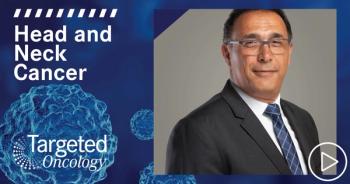
Peers & Perspectives in Oncology
- July 2025
Participants Discuss Optimal Immunotherapy Choices for Metastatic NPC
During a live event, Deborah Wong, MD, PhD, discussed the role of PD-1 inhibitors in nasopharyngeal cancer and their accessibility/safety.
Treatment trends are evolving in the use of PD-1 inhibitors for recurrent or metastatic nasopharyngeal cancer (NPC). Event participants from across the Pacific region shared their diverse clinical experiences with Deborah Wong, MD, PhD, associate clinical professor in the Department of Medicine, Division of Hematology-Oncology and director of the Head and Neck Medical Oncology Program at the University of California, Los Angeles, in a virtual
DISCUSSION QUESTIONS
- Among the available PD-1 inhibitors for recurrent or metastatic NPC, which agent are you most familiar with, and how has this influenced your treatment approach in clinical practice?
- Can you share any experiences—positive or challenging—when using these agents in NPC treatment? What factors have shaped your comfort level with prescribing them?
Deborah Wong, MD, PhD: Among the available PD-1 agents for recurrent metastatic NPC, which agents are you most familiar with, and how has this influenced your treatment approaching clinical practice? Are you all using toripalimab [Loqtorzi], for those of you who've had patients with NPC?
Albert Dekker, MD: Pembrolizumab [Keytruda] is generally well covered for this indication. So in general, I have been using pembrolizumab.
Wong: Certainly, that is readily available, and I think a lot of us have familiarity with pembrolizumab.
John Y. Shin, MD: I would agree as well. I've been using pembrolizumab off label.
Wong: As single agent or in combination with chemotherapy?
Shin: As combination with chemotherapy.
Wong: Is that primarily because it's easy to access in your practice?
Shin: Yes, it is.
Wong: Have you had any issues with having with payers covering it for NPC?
Shin: Surprisingly, no. I haven't had a ton of cases, but all the ones that I've ordered, I didn't get any kickback. I didn't have to do a peer to peer or anything like that. It just got approved.
Wong: Great. It sounds like, Dr Dekker, you have had a similar experience.
Dekker: That's correct. It's generally been easy to secure coverage and reimbursement. When I try to use a different product, I actually got pushback with a recommendation to use pembrolizumab [from the payers].
Hyunseok Kang, MD, MPH: That is interesting. KEYNOTE-122 [NCT02611960], which was a phase 3 study on second-line NPC, came back negative.1 It did not extend overall survival compared with chemotherapy. There was no first-line study done with pembrolizumab, but toripalimab has positive second-line data and positive first-line data.2,3
Wong: That's right. I think that's why the NCCN guidelines have specified toripalimab as a category 1 recommendation.4 I think early on, there was a bit of a delay between…the reporting of the very positive phase 3 data, and our ability in the United States to access to toripalimab. In that situation, though, that's a case in which I have used gemcitabine/cisplatin with pembrolizumab, but since toripalimab is now available in the United States, I've moved to using toripalimab for NPC.
Rita Mukherjee, MD: I've never used toripalimab. Is there an adverse event profile that distinguishes it from pembrolizumab?
Wong: The adverse events are what we would expect from an anti–PD-1 agent.
Kang: I would agree. Toripalimab, cemiplimab [Libtayo], and pembrolizumab, from a clinician standpoint, all behave very similarly.
Wong: Can you share any experiences, positive or challenging, when using these agents, and what factors have shaped your comfort level with prescribing them? It sounds like familiarity is a big one. Any other thoughts on that?
Mukherjee: We have been using pembrolizumab for quite a while, so we've become a little more adept in managing the colitis, rash, nephritis, and hepatitis. I haven't used other agents, so cannot comment on that.
Wong: As Dr Kang mentioned, I think for adverse event profiles, it's quite similar across the board with these PD-1 agents. I will say a lot of times when we do have issues with payers covering it, sometimes patient assistance programs and the ease of navigating that come into play for me. I would say that [is a factor] in addition to familiarity with the drug.
DISCLOSURES: Wong previously reported a consulting or advisory role with Bristol Myers Squibb, Genentech/Roche, Sanofi/Aventis, Blueprint Medicines, and Regeneron. There were no other known disclosures.


















